rise arise raise arouse 讲解与练习
Riseraisearisearouse的区别及练习强烈

一、r ise、arise、raise、arouse四个词看起来很像,其实差别很大。
首先,rise,arise是不及物动词raise,arouse是及物动词1.rise(rose,risen)vi.上升,升起,升高;上涨;文:(躺﹑坐或跪后)起立,起身;起床说明主语自身移向较高位置,常用于日、月、云、雾、烟、蒸汽、河水、温度、物价等,无被动语态。
1)Thesun roseatseveno’clock.太阳七点钟升起。
2)Themoonhasrisenabovethehills.月亮已经从山上升起。
3)Theriverhasrisenbyseveralmeters. 河水上涨了好几米。
4)Theriverisrisingaftertherain.雨后河水涨了。
5)Thetemperatureintheroomisrisinghigherandhigher.房间里的温度越升越高。
6)Soonsteamcanbeseenrisingfromthewetclothes.?很快就看见水蒸气从湿衣服里冒出来。
7)Thepriceisrising.物价正在上涨。
1.arise(arose,arisen)vi..(问题,困难等)出现;发生,产生;主语一般为抽象名词,如problem,trouble,quarrel,difficulty,misunderstanding,disagreem ent古:起身;起来;起立。
无被动语态。
常用短语:arisefrom/outofsth.由……引起;因……产生。
如:1)Problemsarosefromtheoutset.一开始就产生了很多问题。
2)Howdidthequarrelarise?争吵是怎么引起的?3)Theyaretalkingaboutproblemsarisingoutofthelackofcommunication.他们正在谈论由于缺乏交流而产生的问题。
新概念英语(三)语法总结:容易混淆的动词1
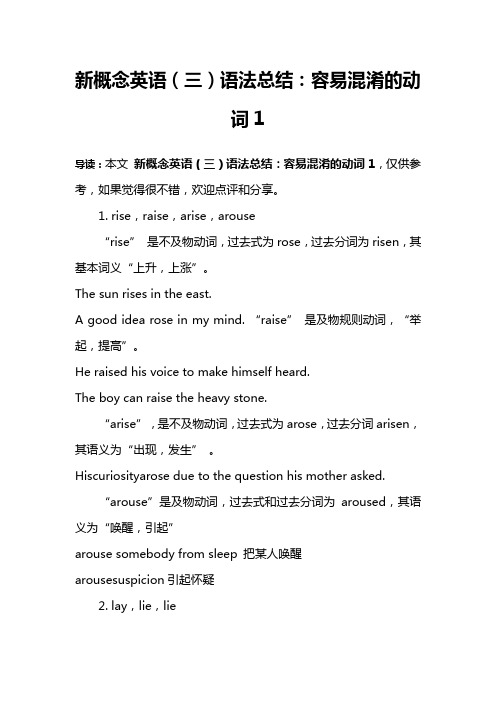
新概念英语(三)语法总结:容易混淆的动词1导读:本文新概念英语(三)语法总结:容易混淆的动词1,仅供参考,如果觉得很不错,欢迎点评和分享。
1. rise,raise,arise,arouse“rise” 是不及物动词,过去式为rose,过去分词为risen,其基本词义“上升,上涨”。
The sun rises in the east.A good idea rose in my mind. “raise” 是及物规则动词,“举起,提高”。
He raised his voice to make himself heard.The boy can raise the heavy stone.“arise”,是不及物动词,过去式为arose,过去分词arisen,其语义为“出现,发生” 。
Hiscuriosityarose due to the question his mother asked.“arouse”是及物动词,过去式和过去分词为aroused,其语义为“唤醒,引起”arouse somebody from sleep 把某人唤醒arousesuspicion引起怀疑2. lay,lie,lie“lay”及物动词,“放置,生蛋”,过去式与过去分词为“laid”I've laid the book on the self.The hen lays an egg every day.“lie”不及物动词“位于,平躺”,过去式为“lay”过去分词“lain”He lay on the floor and slept soundly.Beijing lies in the north of China.“lie”及物动词“说谎”,它是规则动词。
He lied to his teacher.3. sit,seat“sit”不及物动词,过去式与过去分词均为“sat”。
He sat in the classroom reading newspaper.“seat”及物动词,“使就坐”“容纳”。
“影响、rise、arise、raise、arouse、强调”3类英语单词辨析
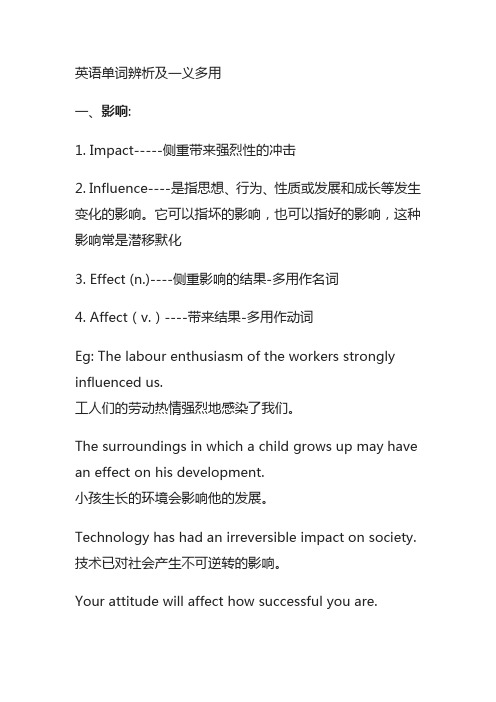
英语单词辨析及一义多用一、影响:1. Impact-----侧重带来强烈性的冲击2. Influence----是指思想、行为、性质或发展和成长等发生变化的影响。
它可以指坏的影响,也可以指好的影响,这种影响常是潜移默化3. Effect (n.)----侧重影响的结果-多用作名词4. Affect(v.)----带来结果-多用作动词Eg: The labour enthusiasm of the workers strongly influenced us.工人们的劳动热情强烈地感染了我们。
The surroundings in which a child grows up may have an effect on his development.小孩生长的环境会影响他的发展。
Technology has had an irreversible impact on society. 技术已对社会产生不可逆转的影响。
Your attitude will affect how successful you are.你的态度会影响你成功的程度。
二、rise、arise、raise、arouse 四个词看起来很像,其实差别很大。
首先,rise, arise 是不及物动词,raise, arouse是及物动词。
(1)rise(rose, risen)vi. 上升,升起, 升高;上涨;起立,起身;起床说明主语自身移向较高位置,常用于日、月、云、雾、烟、蒸汽、河水、温度、物价等,无被动语态。
Eg:The sun rose at seven o’clock. 太阳七点钟升起。
The moon has risen above the hills. 月亮已经从山上升起。
The river has risen by several meters. 河水上涨了好几米。
(2)arise (arose, arisen) vi.(问题,困难等)出现;发生,产生;主语一般为抽象名词,如problem, trouble, quarrel, difficulty, misunderstanding, disagreement起身;起来;起立。
新概念英语第三册语法解析:易混淆的动词
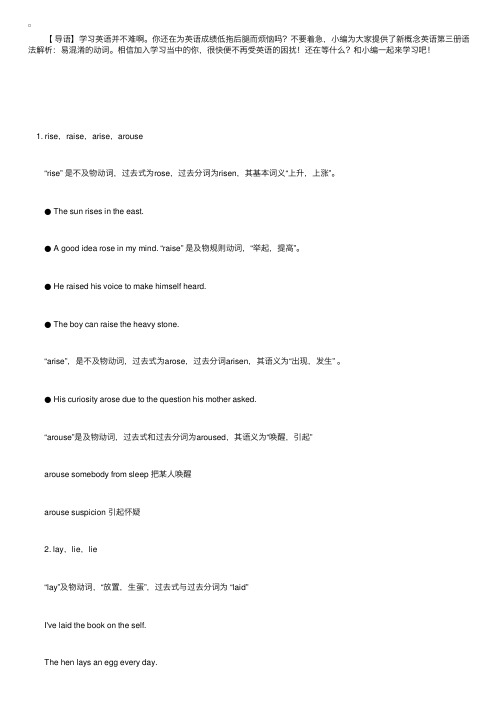
【导语】学习英语并不难啊。
你还在为英语成绩低拖后腿⽽烦恼吗?不要着急,⼩编为⼤家提供了新概念英语第三册语法解析:易混淆的动词。
相信加⼊学习当中的你,很快便不再受英语的困扰!还在等什么?和⼩编⼀起来学习吧! 1. rise,raise,arise,arouse “rise” 是不及物动词,过去式为rose,过去分词为risen,其基本词义“上升,上涨”。
● The sun rises in the east. ● A good idea rose in my mind. “raise” 是及物规则动词,“举起,提⾼”。
● He raised his voice to make himself heard. ● The boy can raise the heavy stone. “arise”,是不及物动词,过去式为arose,过去分词arisen,其语义为“出现,发⽣” 。
● His curiosity arose due to the question his mother asked. “arouse”是及物动词,过去式和过去分词为aroused,其语义为“唤醒,引起” arouse somebody from sleep 把某⼈唤醒 arouse suspicion 引起怀疑 2. lay,lie,lie “lay”及物动词,“放置,⽣蛋”,过去式与过去分词为 “laid” I've laid the book on the self. The hen lays an egg every day. “lie”不及物动词“位于,平躺”,过去式为“lay”过去分词 “lain” He lay on the floor and slept soundly. Beijing lies in the north of China. “lie”及物动词“说谎”,它是规则动词。
He lied to his teacher. 3. sit,seat “sit”不及物动词,过去式与过去分词均为 “sat”。
raise,rise,arise,arouse究竟有什么区别?四词完全辨析!.doc

raise,rise,arise,arouse究竟有什么区别?四词完全辨析!一.raiseraise是及物动词,因此,后面要跟事物,其本身的根本含义是“使上升,让上升”。
After that car accident, she couldn’t raise her arms above her shoulder anymore.车祸过后,她就再也无法将手臂举过肩膀的高度。
同为上升的意思,raise也会衍生出很多其他的意思,如“建设”“养育”“提出(意见,问题)”Her parents died when she was a baby and she was raised by her grandparents.她从小父母就去世了,是祖父母把她抚养大的。
He raised some doubts about this theory.他对这个理论提出了一些疑问。
二.riserise是不及物动词,因此后面并不需要跟事物,很多时候,其意思是“自己上升,自己起来”。
The sun rises in the east every day.太阳每天从东边升起。
有时候也会用于表达”音量“”地位“等非实物的提升My spirits rise whenever I think of my friends.一想到朋友们,我的心情就会好起来。
三.arisearise也同样是不及物动词,很少用于位置上升的意思,一般会解释为“起因于,发生”。
Should the opportunity arise, Id love to go to China.要是有机会的话,我很想去中国。
PS(重要):可能有小伙伴会在一些词汇书上看见arise 有升起的意思,但其实,arise虽然有时会于表达起床,例如:We arose early on Christmas morning.圣诞节早晨,我们早早地起了床。
但其他情况基本都不会表达升起的意思了,所以其他情况用rise 或者arise比价适合。
详细讲解rise-raise-arise-arouse用法辨析教学文案
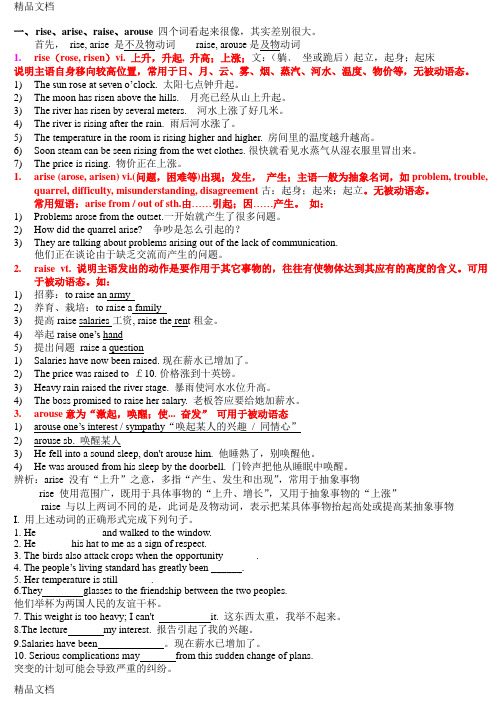
一、rise、arise、raise、arouse 四个词看起来很像,其实差别很大。
首先,rise, arise 是不及物动词raise, arouse是及物动词1.rise(rose, risen)vi. 上升,升起, 升高;上涨;文:(躺﹑坐或跪后)起立,起身;起床说明主语自身移向较高位置,常用于日、月、云、雾、烟、蒸汽、河水、温度、物价等,无被动语态。
1)The sun rose at seven o’clock. 太阳七点钟升起。
2)The moon has risen above the hills. 月亮已经从山上升起。
3)The river has risen by several meters.河水上涨了好几米。
4)The river is rising after the rain. 雨后河水涨了。
5)The temperature in the room is rising higher and higher. 房间里的温度越升越高。
6)Soon steam can be seen rising from the wet clothes. 很快就看见水蒸气从湿衣服里冒出来。
7)The price is rising. 物价正在上涨。
1.arise (arose, arisen) vi.(问题,困难等)出现;发生,产生;主语一般为抽象名词,如problem, trouble,quarrel, difficulty, misunderstanding, disagreement古:起身;起来;起立。
无被动语态。
常用短语:arise from / out of sth.由……引起;因……产生。
如:1)Problems arose from the outset.一开始就产生了很多问题。
2)How did the quarrel arise? 争吵是怎么引起的?3)They are talking about problems arising out of the lack of communication.他们正在谈论由于缺乏交流而产生的问题。
新概念英语第三册语法解析:易混淆的动词

新概念英语第三册语法解析:易混淆的动词1. rise,raise,arise,arouse“rise” 是不及物动词,过去式为rose,过去分词为risen,其基本词义“上升,上涨”。
● The sun rises in the east.● A good idea rose in my mind. “raise” 是及物规则动词,“举起,提升”。
● He raised his voice to make himself heard.● The boy can raise the heavy stone.“arise”,是不及物动词,过去式为arose,过去分词arisen,其语义为“出现,发生” 。
● His curiosity arose due to the question his mother asked.“arouse”是及物动词,过去式和过去分词为aroused,其语义为“唤醒,引起”arouse somebody from sleep 把某人唤醒arouse suspicion 引起怀疑2. lay,lie,lie“lay”及物动词,“放置,生蛋”,过去式与过去分词为“laid”I've laid the book on the self.The hen lays an egg every day.“lie”不及物动词“位于,平躺”,过去式为“lay”过去分词“lain”He lay on the floor and slept soundly.Beijing lies in the north of China.“lie”及物动词“说谎”,它是规则动词。
He lied to his teacher.3. sit,seat“sit”不及物动词,过去式与过去分词均为“sat”。
He sat in the classroom reading newspaper.“seat”及物动词,“使就坐”“容纳”。
英语词汇语法速记:rise、raise、arise、arouse
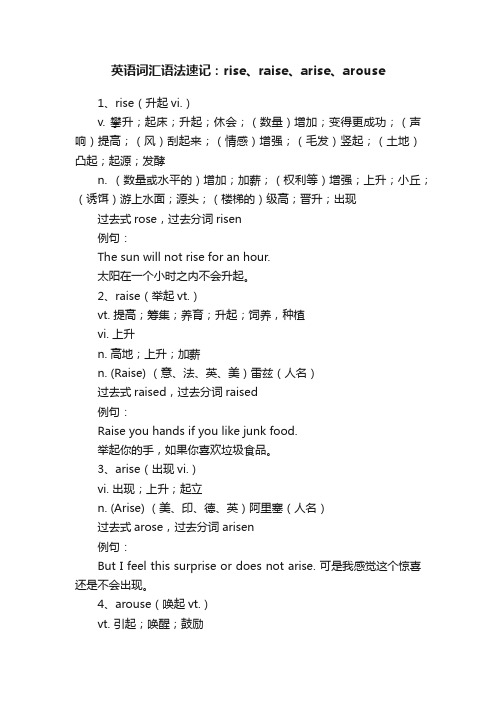
英语词汇语法速记:rise、raise、arise、arouse
1、rise(升起vi.)
v. 攀升;起床;升起;休会;(数量)增加;变得更成功;(声响)提高;(风)刮起来;(情感)增强;(毛发)竖起;(土地)凸起;起源;发酵
n. (数量或水平的)增加;加薪;(权利等)增强;上升;小丘;(诱饵)游上水面;源头;(楼梯的)级高;晋升;出现
过去式rose,过去分词risen
例句:
The sun will not rise for an hour.
太阳在一个小时之内不会升起。
2、raise(举起vt.)
vt. 提高;筹集;养育;升起;饲养,种植
vi. 上升
n. 高地;上升;加薪
n. (Raise) (意、法、英、美)雷兹(人名)
过去式raised,过去分词raised
例句:
Raise you hands if you like junk food.
举起你的手,如果你喜欢垃圾食品。
3、arise(出现vi.)
vi. 出现;上升;起立
n. (Arise) (美、印、德、英)阿里塞(人名)
过去式arose,过去分词arisen
例句:
But I feel this surprise or does not arise. 可是我感觉这个惊喜还是不会出现。
4、arouse(唤起vt.)
vt. 引起;唤醒;鼓励
vi. 激发;醒来;发奋
过去式aroused,过去分词aroused
例句:
We must arouse them to fight with enemies. 我们必须唤起他们同敌人斗争。
Rise,raise,arise,arouse区别及练习精简

1. Rise, raise, arise, arouse四个词看起来很像,其实差别很大。
首先,rise,arise是不及物动词raise,arouse是及物动词其次,rise意为"升起,增高増涨” ——rise ( rose, risen)The sun rose at seven o'clock. 太阳七点钟升起。
The river is rising after the rain. 雨后河水涨了。
arise意为"开始发生,出现,产生” ------------------------------- arise( arose,arisen)且arise from "起源于,发生于”固搭。
Problems arose from the outset.一开始就产生了很多问题。
raise意为"增加,举起;提高” 易考到1. 招募:to raise an army2. 养育、栽培:to raise a family3. 提高raise salaries工资,raise the rent租金。
4. 举起raise one' s hand5. 提出问题raise a questionarouse意为"激起,唤醒;使…奋发”l. arouse one' s in terest / sympathy “唤起某人的兴趣/同情心”2. arouse sb.唤醒某人He fell into a sound sleep, don't arouse him. 他睡熟了,别唤醒他。
练练手1. Last year the advertis ing rate ______ by 20 perce nt.A)raised B)aroused C)arose D)rose2. They _____ glasses to the frien dship betwee n the two peoples.他们举杯为两国人民的友谊干杯。
(完整版)Rise,raise,arise,arouse区别及练习精简
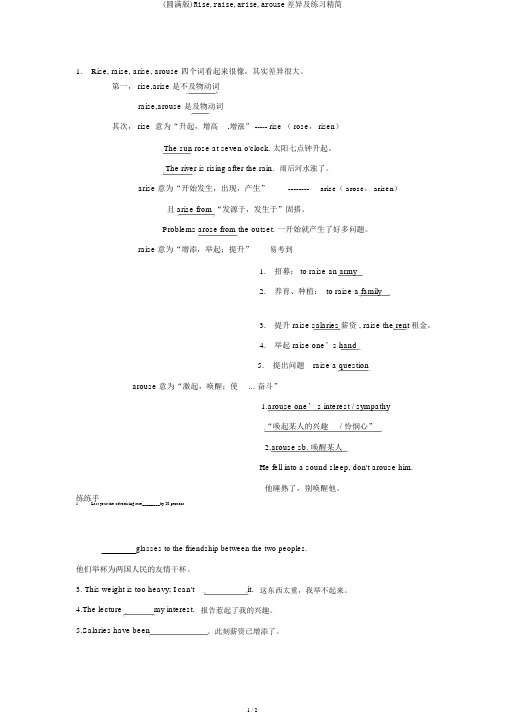
1.Rise, raise, arise, arouse 四个词看起来很像,其实差异很大。
第一, rise,arise 是不及物动词raise,arouse 是及物动词其次, rise 意为“升起,增高,增涨” ----- rise ( rose, risen)The sun rose at seven o'clock. 太阳七点钟升起。
The river is rising after the rain.雨后河水涨了。
arise 意为“开始发生,出现,产生”--------arise( arose, arisen)且 arise from “发源于,发生于”固搭。
Problems arose from the outset. 一开始就产生了好多问题。
raise 意为“增添,举起;提升”易考到1. 招募: to raise an army2. 养育、种植: to raise a family3. 提升 raise salaries薪资 , raise the rent租金。
4. 举起 raise one’s hand5. 提出问题raise a questionarouse 意为“激起,唤醒;使... 奋斗”1.arouse one’ s interest / sympathy“唤起某人的兴趣/ 怜悯心”2.arouse sb. 唤醒某人He fell into a sound sleep, don't arouse him.他睡熟了,别唤醒他。
练练手st year the advertising rate________by 20 percent.glasses to the friendship between the two peoples.他们举杯为两国人民的友情干杯。
3. This weight is too heavy; I can't it.这东西太重,我举不起来。
arise,raise, rise 区别
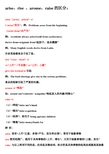
arise、rise、arouse、raise的区分:arise(arose,arisen)vi1 occur“发生”,例:Problems arose from the beginning.2 arise from“由产生”例:Accidents always arise/result from carelessness.derive from=originate from“起因于,追本溯源”例:Many English words derive from Latin.许多英语都来自于拉丁语。
rise(rose,risen)vivi.“上升”(不及物)n.“上升,上涨”give rise to=lead to引起例:The food shortage give rise to the serious problems.食品的短缺引起了严重的问题。
arouse vt “唤起”如,arouse one’s interest / sympathy“唤起某人的兴趣/同情心”raise vt(1)“举起”raise one’s hand(2)“提出”raise a ques tion(3)“抚养”,相当于bring up/raise children(4)“筹集”raise money/funds for辨析:arise没有“上升”之意,多指“产生、发生和出现”,常用于抽象事物rise使用范围广,既用于具体事物的“上升、增长”,又用于抽象事物的“上涨、发生”raise与以上两词不同的是,此词是及物动词,表示把某具体事物抬起高处或提高某抽象事物(工资、地位等)Exercises:st year the advertising rate ________by 20 percent.A)raised B)aroused C)arose D)rose2.Your improper words will give _________to doubts concerning your true intentions.A)rise B)reason C)suspicion D)impulse3. Our hopes ___ and fell in the same instant. aroused; arose; raised; rose。
raise,rise,arise和arouse辨析
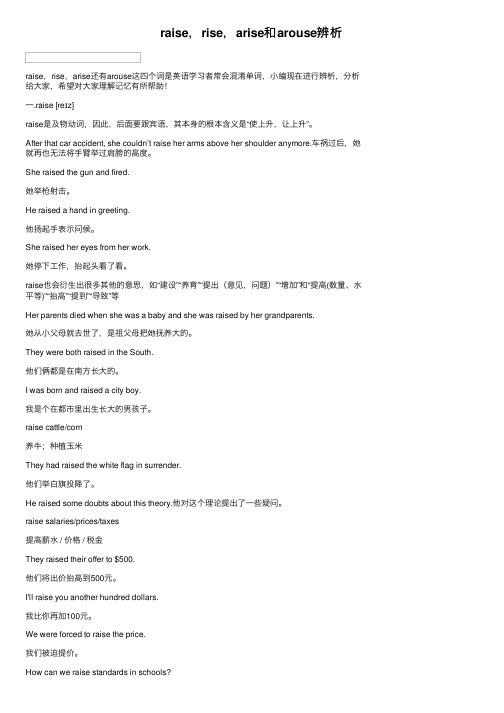
我们怎样才能提⾼学校的⽔平?He set about raising an army .他着⼿组建⼀⽀部队。
The book raises many important questions .这本书提出了许多重要问题。
I'm glad you raised the subject of money.我很⾼兴你提到了钱。
The plans for the new development have raised angry protests from local residents.新的开发计划惹得当地居民愤怒抗议。
It wasn't an easy audience but he raised a laugh with his joke.虽然这些观众很难逗乐,但他的笑话还是引起了⼀阵笑声。
It had been a difficult day but she managed to raise a smile.尽管这⼀天很不顺利,但她还是努⼒露出笑容。
The horses' hooves raised a cloud of dust.马蹄翻飞,扬起⼀⽚尘⼟。
raise a blockade/a ban/an embargo/a siege解除封锁 / 禁令 / 禁运 / 包围(通过⽆线电或电话)与…取得联系,和…通话to contact sb and speak to them by radio or telephoneWe managed to raise him on his mobile phone.我们打他的移动电话,总算找到了他。
raise sth to sb/sth(为…)建造,树⽴(塑像等)The town raised a memorial to those killed in the war.这座⼩镇为战争中牺牲的⼈树⽴了⼀座纪念碑。
raise your glass (to sb)举杯祝酒raise the roof(在屋内)⼤声喧闹,闹翻天raise sb's spirits使振奋;使⿎起勇⽓raise/lower one’s sights提⾼ / 降低要求;眼光变⾼ / 变低⼆.rise [raɪz]上升;攀升;提⾼;达到较⾼⽔平(或位置);起床;起⽴;站起来;升起; 过去式: rose 过去分词: risenrise是不及物动词,因此后⾯并不需要跟事物,很多时候,其意思是“⾃⼰上升,⾃⼰起来”。
新概念英语第三册语法解析:易混淆的动词(1)
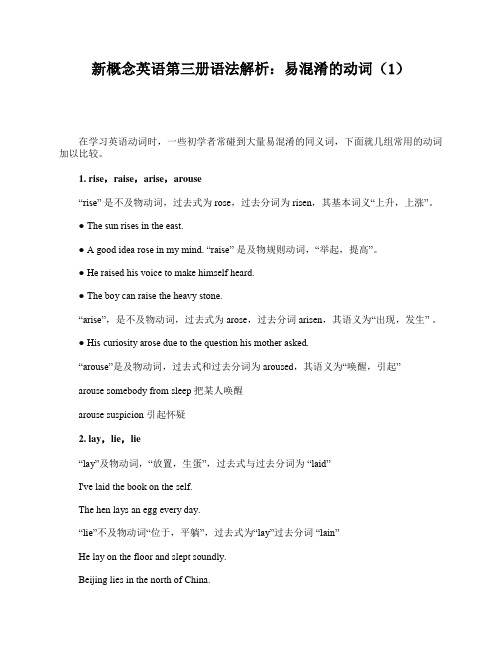
新概念英语第三册语法解析:易混淆的动词(1)在学习英语动词时,一些初学者常碰到大量易混淆的同义词,下面就几组常用的动词加以比较。
1. rise,raise,arise,arouse“rise” 是不及物动词,过去式为rose,过去分词为risen,其基本词义“上升,上涨”。
● The sun rises in the east.● A good idea rose in my mind. “raise” 是及物规则动词,“举起,提高”。
● He raised his voice to make himself heard.● The boy can raise the heavy stone.“arise”,是不及物动词,过去式为arose,过去分词arisen,其语义为“出现,发生” 。
● His curiosity arose due to the question his mother asked.“arouse”是及物动词,过去式和过去分词为aroused,其语义为“唤醒,引起”arouse somebody from sleep 把某人唤醒arouse suspicion 引起怀疑2. lay,lie,lie“lay”及物动词,“放置,生蛋”,过去式与过去分词为“laid”I've laid the book on the self.The hen lays an egg every day.“lie”不及物动词“位于,平躺”,过去式为“lay”过去分词“lain”He lay on the floor and slept soundly.Beijing lies in the north of China.“lie”及物动词“说谎”,它是规则动词。
He lied to his teacher.3. sit,seat“sit”不及物动词,过去式与过去分词均为“sat”。
He sat in the classroom reading newspaper.“seat”及物动词,“使就坐”“容纳”。
词汇辨析:arise,rise,raise,arouse和rouse
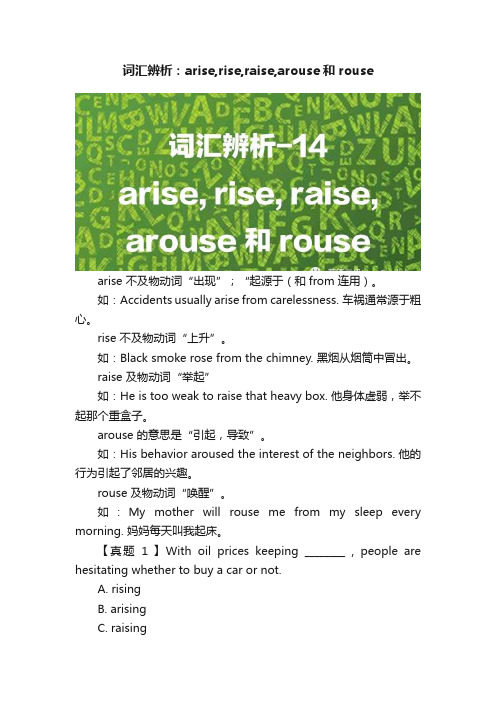
词汇辨析:arise,rise,raise,arouse和rousearise 不及物动词“出现”;“起源于(和from 连用)。
如:Accidents usually arise from carelessness. 车祸通常源于粗心。
rise 不及物动词“上升”。
如:Black smoke rose from the chimney. 黑烟从烟筒中冒出。
raise 及物动词“举起”如:He is too weak to raise that heavy box. 他身体虚弱,举不起那个重盒子。
arouse 的意思是“引起,导致”。
如:His behavior aroused the interest of the neighbors. 他的行为引起了邻居的兴趣。
rouse 及物动词“唤醒”。
如:My mother will rouse me from my sleep every morning. 妈妈每天叫我起床。
【真题1 】With oil prices keeping ________ , people are hesitating whether to buy a car or not.A. risingB. arisingC. raisingD. arousing『正确答案』A『答案解析』句意:油价持续上升,人们对于买不买车犹豫不决。
【真题2 】The problem has _______ simply because you didn’t follow my instruction.A. raisedB. risenC. arisenD. aroused『正确答案』C『答案解析』句意:问题已经出现了,仅仅因为你没有遵循我的指导。
【例题 3 】Voices were _____ as the argument between the two motorists became more bad-tempered.A. spokenB. raisedC. developedD. increased『正确答案』B『答案解析』句意:随着两个司机的争吵愈演愈烈,双方都提高了嗓门。
raise,rise,arise,arouse辨析
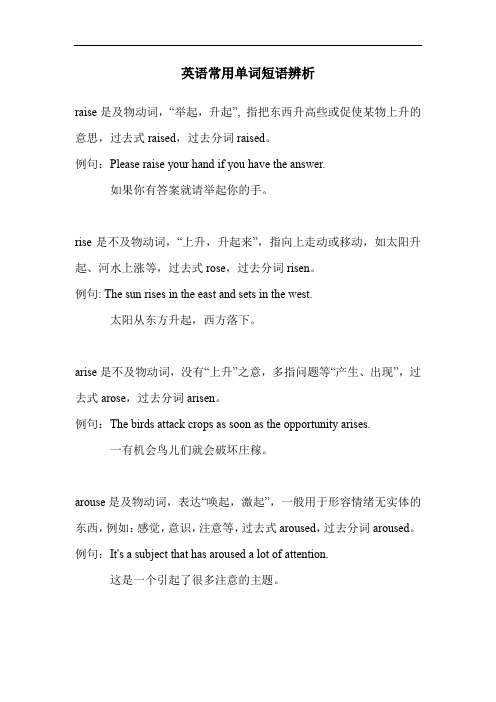
英语常用单词短语辨析
raise是及物动词,“举起,升起”, 指把东西升高些或促使某物上升的意思,过去式raised,过去分词raised。
例句:Please raise your hand if you have the answer.
如果你有答案就请举起你的手。
rise是不及物动词,“上升,升起来”,指向上走动或移动,如太阳升起、河水上涨等,过去式rose,过去分词risen。
例句: The sun rises in the east and sets in the west.
太阳从东方升起,西方落下。
arise是不及物动词,没有“上升”之意,多指问题等“产生、出现”,过去式arose,过去分词arisen。
例句:The birds attack crops as soon as the opportunity arises.
一有机会鸟儿们就会破坏庄稼。
arouse是及物动词,表达“唤起,激起”,一般用于形容情绪无实体的东西,例如:感觉,意识,注意等,过去式aroused,过去分词aroused。
例句:It's a subject that has aroused a lot of attention.
这是一个引起了很多注意的主题。
riseraisearisearouse口诀
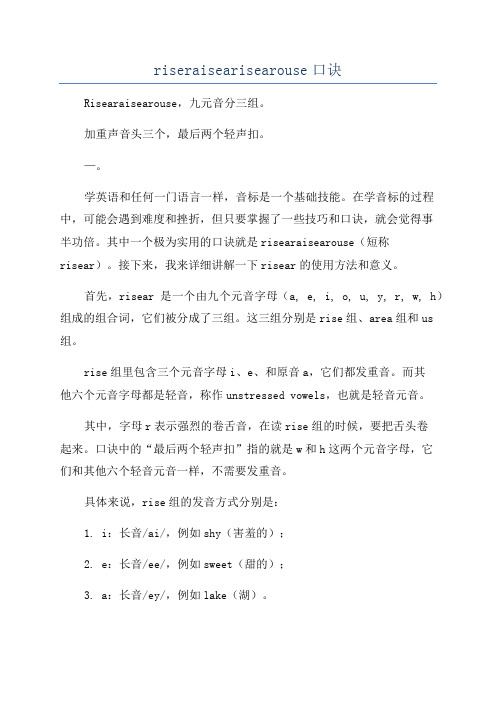
riseraisearisearouse口诀Risearaisearouse,九元音分三组。
加重声音头三个,最后两个轻声扣。
—。
学英语和任何一门语言一样,音标是一个基础技能。
在学音标的过程中,可能会遇到难度和挫折,但只要掌握了一些技巧和口诀,就会觉得事半功倍。
其中一个极为实用的口诀就是risearaisearouse(短称risear)。
接下来,我来详细讲解一下risear的使用方法和意义。
首先,risear是一个由九个元音字母(a, e, i, o, u, y, r, w, h)组成的组合词,它们被分成了三组。
这三组分别是rise组、area组和us 组。
rise组里包含三个元音字母i、e、和原音a,它们都发重音。
而其他六个元音字母都是轻音,称作unstressed vowels,也就是轻音元音。
其中,字母r表示强烈的卷舌音,在读rise组的时候,要把舌头卷起来。
口诀中的“最后两个轻声扣”指的就是w和h这两个元音字母,它们和其他六个轻音元音一样,不需要发重音。
具体来说,rise组的发音方式分别是:1. i:长音/ai/,例如shy(害羞的);2. e:长音/ee/,例如sweet(甜的);3. a:长音/ey/,例如lake(湖)。
area组包含两个元音字母a和e,它们都要发重音,但是a和e的发音有一些不同。
a要发长音,e发短音。
具体来说,area组的发音方式分别是:1. a:长音/ei/,例如great(伟大的);2. e:短音/ea/,例如bear(熊)。
us组包含了四个元音字母u、o、u和e(这个e是被称为schwa(弱读元音)的音素,在这里它的发音类似于短音/uh/)。
在us组里,u和o 发重音,u要发长音,而o要发短音。
而u和e是轻音,不需要发重音。
具体来说,us组的发音方式分别是:1. u:长音/ju/,例如new(新的);2. o:短音/ah/,例如hot(热的);3. u:弱读音/uh/,例如supply(供应);在日常的英语学习和使用中,risear口诀能够帮助我们更快地学会元音的发音,提高口语表达的准确性。
新概念英语第三册语法解析:易混淆动词
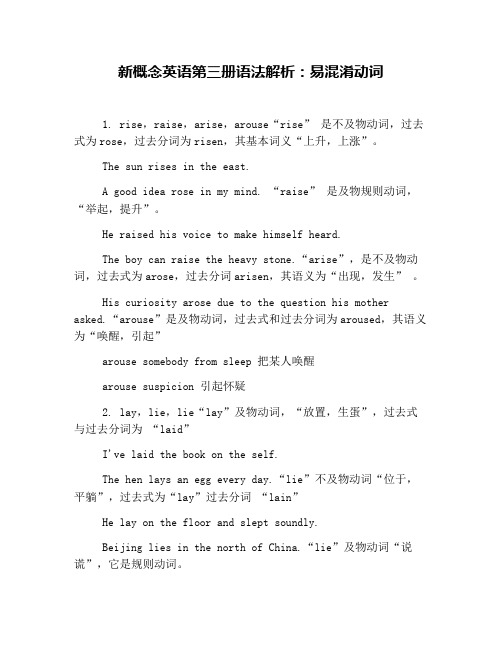
新概念英语第三册语法解析:易混淆动词1. rise,raise,arise,arouse“rise” 是不及物动词,过去式为rose,过去分词为risen,其基本词义“上升,上涨”。
The sun rises in the east.A good idea rose in my mind. “raise” 是及物规则动词,“举起,提升”。
He raised his voice to make himself heard.The boy can raise the heavy stone.“arise”,是不及物动词,过去式为arose,过去分词arisen,其语义为“出现,发生” 。
His curiosity arose due to the question his mother asked.“arouse”是及物动词,过去式和过去分词为aroused,其语义为“唤醒,引起”arouse somebody from sleep 把某人唤醒arouse suspicion 引起怀疑2. lay,lie,lie“lay”及物动词,“放置,生蛋”,过去式与过去分词为“laid”I've laid the book on the self.The hen lays an egg every day.“lie”不及物动词“位于,平躺”,过去式为“lay”过去分词“lain”He lay on the floor and slept soundly.Beijing lies in the north of China.“lie”及物动词“说谎”,它是规则动词。
He lied to his teacher.3. sit,seat“sit”不及物动词,过去式与过去分词均为“sat”。
He sat in the classroom reading newspaper.“seat”及物动词,“使就坐”“容纳”。
- 1、下载文档前请自行甄别文档内容的完整性,平台不提供额外的编辑、内容补充、找答案等附加服务。
- 2、"仅部分预览"的文档,不可在线预览部分如存在完整性等问题,可反馈申请退款(可完整预览的文档不适用该条件!)。
- 3、如文档侵犯您的权益,请联系客服反馈,我们会尽快为您处理(人工客服工作时间:9:00-18:30)。
from this sudden change of plans. 突变的计划可能会导致严重的纠纷。
II. 从A、B、C、D四个选项中,选出可以填入空白处的最佳选项。
1.The prices are ___D___ fast these days. Nobody can get the prices ______. A. going down; to bring down B. rising; bring down C. raising; bring down D. rising; brought down.
problem, trouble, quarrel, difficulty, misunderstanding, disagreement古:起身;起来;起立。无被动语态。 常用短语:arise from / out of sth. 由……引起;因……产生。 如: 1) Problems arose from the outset.一开始就产生了很多问题。
一、 rise、arise、raise、arouse 四个词看起来很像,其实差别很大。 首先, rise, arise 是不及物动词 raise, arouse 是及物动词 1. rise(rose, risen)vi. 上升,升起, 升高;上涨;文:(躺﹑ 坐
或跪后)起立,起身;起床 说明主语自身移向较高位置,常用于日、月、云、雾、烟、蒸汽、
2) 2) How did the quarrel arise? 争吵是怎么引起的?
3) 3) They are talking about problems arising out of the lack of communication. 他们正在谈论由于缺乏交流而产生的问题。
2. raise vt. 说明主语发出的动作是要作用于其它事物的,往往有使物体达到其应有的高度的含义。可 用 于被动语态。如: 1) 招募:to raise an army 2) 养育、栽培:to raise a family 3) 提高raise salaries工资 raise the rent租金。 4) 举起raise one’s hand 5) 提出问题 raise a question 1.) Salaries have now been raised. 现在薪水已增加了。 2) The price was raised to £10. 价格涨到十英镑。 3) Heavy rain raised the river stage. 暴雨使河水水位升高。 4) The boss promised to raise her salary. 老板答应要给她加薪水。
4. The people’s living standard has greatly been __r_a_i_s_e_d__.
5. Her temperature is still ___r_i_s_i_n_g__.
6.They___r_a_i_s_e_d___ glasses to the friendship between the two peoples. 他们举 杯为两国人民的友谊干杯。
7. This weight is too heavy; I can't _____ra__is__e______ it. 这东西太重,我举不起来。
8.The lecture __a_r_o__u_s_e_d__ my interest. 报告引起了我的兴趣。
9.Salaries have been ___r_a_i_s_e_d____ 。 现在薪水已增加了。
4) He was aroused from his sleep by the doorbell. 门铃声把他从睡眠中唤醒。
aris物 rise 使用范围广,既用于
具体事物的“上升、增长”,又用于抽象事物的“上涨” raise 与以上两词不同的是,此词是及物动词,表 示把某具体事物抬起高处或提高某抽象事物
I. 用上述动词的正确形式完成下列句子。
1. He _a_r_o__s_e__/_r_o_s_e____ and walked to the window.
2. He __r_a__is__e_d__ his hat to me as a sign of respect.
3. The birds also attack crops when the opportunity __a__ri_s_e__s__.
河水、温度、物价等,无被动语态。
1)The sun rose at seven o’clock. 太阳七点钟升起。 2) The moon has risen above the hills. 月亮已经从山上升起。 3) The river has risen by several meters. 河水上涨了好几米. 4) The river is rising after the rain. 。 雨后河水涨了 5) The temperature in the room is rising higher
3. arouse意为“激起,唤醒;使... 奋发” 可用于被动语态 1) arouse one’s interest / sympathy“唤起某人的兴趣 / 同情心” 2) arouse sb. 唤醒某人 3) He fell into a sound sleep, don't arouse him. 他睡熟了,别唤醒他。
4. Last year the advertising rate____D____by 20 percent. A. raised B. aroused C. arose D. rose
2. They’ve _C__ up to 20,000 yuan for the Hope Project. A. rose B. raise C. raised D. risen 3. When the question _B__ at the meeting, no one could answer it. A. rose B. arose C. came D. raised
and higher. 。 房间里的温度越升越高 6) Soon steam can be seen rising from the wet
clothes. 。 很快就看见水蒸气从湿衣服里冒出来 7) The price is rising. 。 物价正在上涨
1. arise (arose, arisen) vi. .(问题,困难等)出现;发生, 产生;主语一般为抽象名词,如
